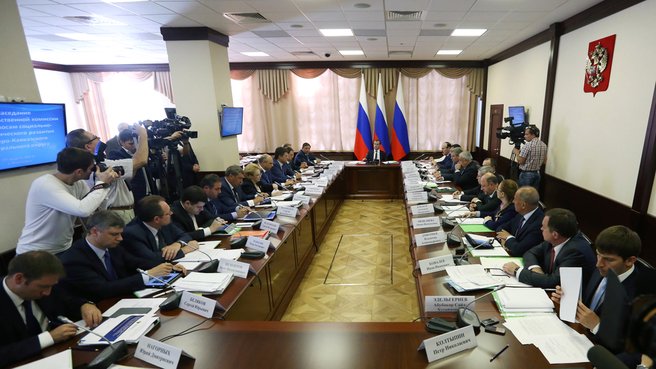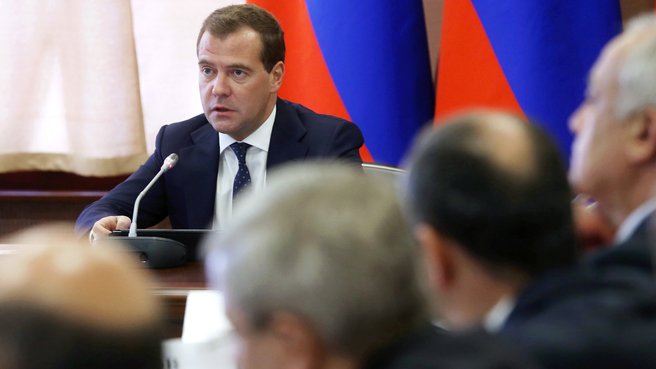The participants discussed the progress of the North Caucasus Federal District Development until 2025 programme, the fulfillment of Presidential Executive Orders of May 7, 2012, and a planned working group on the development of agriculture in the North Caucasus District.
Opening remarks by Prime Minister Dmitry Medvedev:
Meeting of the Government Commission on the Socioeconomic Development of the North Caucasus Federal District
Let’s discuss the main issues on our agenda, which have to do with the North Caucasus development programme and a series of presidential executive orders. I want to remind you that these documents contain figures that describe our targets to create more high-productivity jobs, to improve healthcare and social services, and to develop small businesses.
It is clear that our efficiency today will influence socioeconomic stability in the region, which means people’s well-being as much as their security. It is important that federal, regional and local governments coordinate their efforts to achieve this.
We should monitor the spending of the programme funds very carefully, which is not always easy, as you know. Strong government and public control is needed. I believe we need to set up a working group, possibly even one attached to this commission, and put in in charge of spending control issues.
Context
All the decisions should certainly be implemented; I do not think I have to explain this to anyone here.
Now a few words about specific problems. The first issue is raising the salaries of teachers, doctors and other individuals working in the public sector. We have set ourselves an ambitious goal here, which is nevertheless quite achievable: to raise their pay to at least the region’s average and twice the salaries paid for some other local jobs by 2018. The present situation in the North Caucasus is rather complicated. Their current monthly salaries are still below 7,000 roubles, or 40% of the regional average. At the same time, we have seen some progress. The salaries of doctors, nurses and other medical staff are growing steadily. The Stavropol Territory, Dagestan and Ingushetia have achieved the programme targets. Yet, progress in the North Caucasus overall remains slow. We need to find funding in addition to the federal budget. Let’s discuss this today. One of the important ways to free some money is to optimise the sector and reduce inefficient spending by regional and municipal institutions.
Healthcare is the next issue on our agenda. This primarily involves improvement of the local healthcare services including consultations, treatment and ambulance services, as well as early diagnostics – especially in rural and hard-to-reach areas which are common in the North Caucasus. Children’s healthcare, building pediatric and perinatal health centers are priorities here.
Our third issue is kindergarten waiting lists for children aged 3 to 7. This problem is common for many regions, but it is especially acute in the North Caucasus. We are working closely on this, aiming to eliminate waiting lists within one or two years. The waiting time could be shortened by opening private institutions. There have been some initiatives; I would like the regional leaders to look at them. By the way, I just met with the local young people at the Mashuk centre, and they asked me a few questions about this. I mean, young people seem to think this is right, so please bear this in mind.
As for the development programme until 2025, I think what we must focus on is creating an environment for confident economic growth. We must offer lucrative projects to investors in fields such as power generation, rural development, agriculture, and, of course, tourism – a sector we often discuss and have done a great deal to develop, but still the level of tourism in the region remains low. I have discussed this with the youth forum as well.
These goals will obviously not be easy to attain, especially given the local employment market and the need to organise high-quality education, which is absolutely necessary for professional growth of the local workforce. Each of the existing problems has many aspects and is difficult to address, but this is unavoidable. The Caucasus as a region has many advantages, along with its own difficulties, which can be overcome with the federal government support. This potential should be used wisely. We will need to monitor the figures and compare them with the plan, which must be submitted to the Government for approval by the end of the month.
Let’s now discuss the issues I have listed in the context of the North Caucasus Federal District. First we’ll hear the Finance Minister’s report, and then I would like the regional leaders to speak.
<…>













